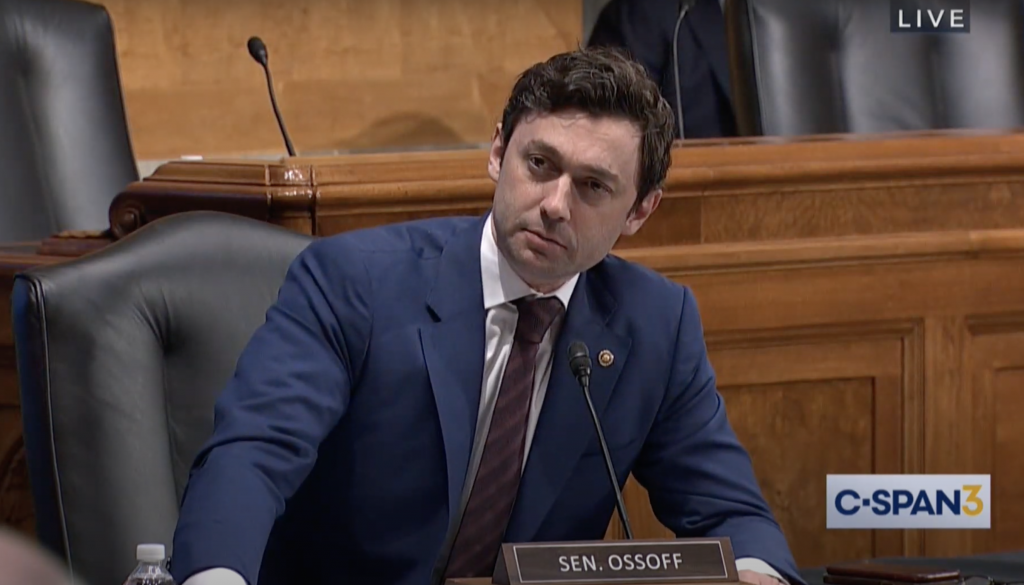Washington, D.C. — U.S. Senator Jon Ossoff is continuing his work to crack down on violent crime in Georgia.
Yesterday in a Senate Homeland Security Committee hearing, Sen. Ossoff pressed FBI Director Christopher Wray to address the violent crime crisis in Georgia and nationwide, calling on the FBI to ramp up their crime prevention and drug deterrence efforts in Georgia’s communities.
Sen. Ossoff also urged Director Wray to continue working with Georgia’s local law enforcement agencies to amplify these efforts.
“What can the FBI continue to do and what more can you do to help protect communities in Georgia who are fearful?” Sen. Ossoff asked Director Wray. “Will you continue to work with local law enforcement in Georgia to crack down on the violent crime that’s preying on innocent citizens?”
Click here to watch Sen. Ossoff’s line of questioning:
Please find a transcript of the exchange below:
SEN. OSSOFF: “Thank you to our panelists for your service to the country and in the national defense, defense of public safety. Director Wray, always a pleasure to see a fellow Georgian, and thank you for your continued service as well.
“Each time we’ve engaged in a setting like this one, I’ve asked you to assess the drivers of elevated levels of violent crime in Georgia and nationwide.
“According to FBI data, violent crime did increase from 2020 to 2021. Could you please provide the committee with an updated assessment of what is driving this dynamic?
DIRECTOR CHRISTOPHER WRAY: “So there are a lot of things driving the violent crime crisis that is occurring in this country, in Georgia, and elsewhere. There are a few things. First, I would say the traditional drivers are all there. Drugs, illegal gun trafficking, gangs, socioeconomic factors. So those are all still present. But in addition to that, we are seeing, and I hear this from chiefs and sheriffs all the time, as well as from our own agents, an alarming uptick in the incidence of juveniles engaging in violence. Often graduating from carjackings to even worse violence. And that is a real challenge for the legal system, because we’re not set up to very effectively deal with crimes committed by minors.
“We are also seeing not everywhere, but an awful lot of places, we are seeing way too many dangerous offenders getting back out on the streets. And the only thing more frustrating to the hard working men of law enforcement than having to arrest somebody who should have been behind bars, is having to arrest the same person over and over again. And that’s a product of any number of things. It could be backlogs, it could be certain prosecution practices, certain kind of bail practices, and of course the juvenile issue that I mentioned. So those are some of the things that are driving it.
“In Georgia in particular, pretty much every week, I feel like our Atlanta field office is engaging in some kind of operation where they’re seizing drugs, guns, cash, whether it’s meth, whether it’s fentanyl. So, they’re experiencing a lot of the same things that we’re seeing nationally. Certainly, neighborhood gangs are a big phenomenon in our home state.
“We’re also seeing, I would add, two other things that have a little bit of a Georgia wrinkle to it. One is juveniles who post-COVID have not returned to school. And so that may contribute to the juvenile effect. And we’re seeing, you know, violent criminals who are either detained or imprisoned because they’re serving a sentence who still have access to their cellular phones and are able to continue to participate in the activity, despite best efforts by the corrections officials, to continue to participate in the violent activities.
“So, these are some of the things. I guess one last one, an alarming phenomenon of switches, which convert otherwise lawful weapons into fully automatic and that course increases the violent potential.
SEN. OSSOFF: “Thank you, Director Wray. You have a new SAC in that Atlanta office and welcomed her upon her arrival. Wish her and her team the best. What can the FBI continue to do and what more can you do to help protect communities in Georgia who are fearful? Who are fearful that they may face carjacking? Or mugging? Or aggravated assault out on the sidewalk or at a shopping mall? What are you doing and what more can you do? And will you continue to work with local law enforcement in Georgia to crack down on the violent crime that’s preying on innocent citizens?
DIRECTOR WRAY: “Violent crime is a major, major priority for the FBI. As I think I said in response to an earlier question, I still think it continues to be the place where we have the most single allocation of resources in terms of personnel. We have safe streets task forces that focus on sort of the gang violence. We have other kinds of violent crime task forces, all of which allow us to bring together what the FBI has to bear up with state and local partners who participate on those task forces. We do active shooter training and things like that to help the community better protect itself.
“Our lab, close to half of the work that they do from a forensic side is in support of violent crime cases often for our state local partners. Senator Scott and I had a conversation about the tip line that we have out in West Virginia, where we prioritize getting threats to life out to state and local partners on the violent crime side.
“So there’s a whole host of things that we’re doing but this remains top of mind for me and for my team, and when I am talking to chiefs and sheriffs this is always the first topic we talk about in the last topic talk about because it’s so much on everyone’s mind.”
SEN. OSSOFF: “Thank you, Director.”
